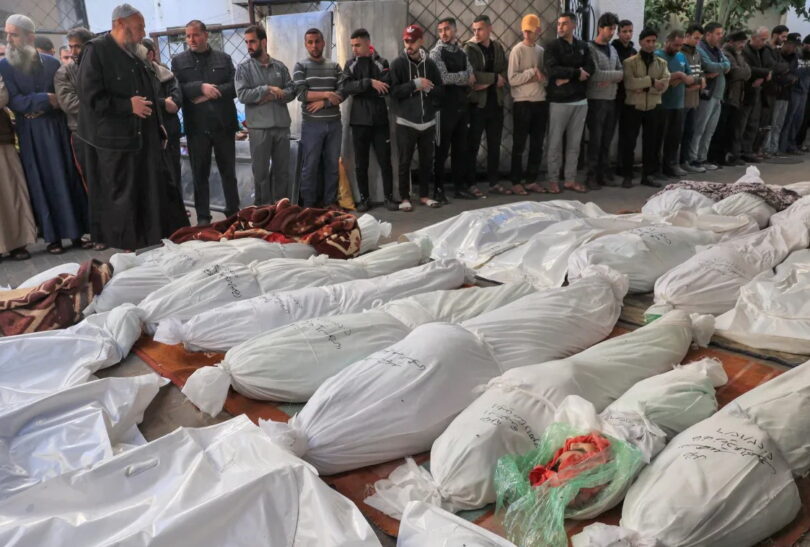Monitoring Desk
GAZA: Israeli warplanes struck parts of the Gaza Strip in relentless bombardment Saturday, hitting some of the dwindling bits of land it had told Palestinians to evacuate to in the territory’s south.
The strikes came a day after the United States vetoed a United Nations resolution demanding an immediate humanitarian cease-fire in Gaza, despite its wide support. The vote in the 15-member Security Council was 13-1, with the United Kingdom abstaining.
“Attacks from air, land and sea are intense, continuous and widespread,” UN Secretary-General Antonio Guterres told the council before the vote. Gaza residents “are being told to move like human pinballs – ricocheting between ever-smaller slivers of the south, without any of the basics for survival.” Gaza was at a “breaking point” with the humanitarian support system at risk of collapse, and Guterres said he feared “the consequences could be devastating for the security of the entire region.”
Gaza’s borders with Israel and Egypt are effectively sealed, leaving 2.3 million Palestinians with no option other than to seek refuge within the territory 25 miles (40 kilometers) long by some 7 miles (11 kilometers) wide. With the war now in its third month, the Palestinian death toll in Gaza has surpassed 17,400, the majority women and children, according to the Health Ministry in the Hamas-controlled territory, whose counts do not differentiate between civilians and combatants.
Two hospitals in central and southern Gaza received the bodies of a total of 133 people from Israeli bombings over the past 24 hours, the Health Ministry said midday Saturday. Israel holds the Hamas militants responsible for civilian casualties, accusing them of using civilians as human shields, and says it has made considerable efforts with evacuation orders to get civilians out of harm’s way.
It says 93 Israeli soldiers have died in the ground offensive after Hamas’ deadly Oct. 7 raid in Israel that killed about 1,200 people, mostly civilians, and took about 240 hostage.
Hamas said Saturday it continued its rocket fire into Israel. In Gaza, residents reported airstrikes and shelling in the north and south, including the city of Rafah near the Egyptian border — one area where the Israeli army had ordered civilians to evacuate to. In a colorful classroom there, knee-high children’s tables were strewn with rubble.
“We now live in the Gaza Strip and are governed by the American law of the jungle. America has killed human rights,” said Rafah resident Abu Yasser Al-Khatib. “The Palestinian people will not leave and do not want to leave.” Israel has been trying to secure the military’s hold on northern Gaza despite heavy resistance from Hamas. Tens of thousands of residents are believed to remain despite evacuation orders, six weeks after troops and tanks rolled in.
The Israeli military said Saturday its forces fought and killed Hamas militants and found weapons inside a school in Shijaia in a densely populated neighborhood of Gaza City. It said soldiers discovered a tunnel shaft in the same neighborhood where they found an elevator, and in a separate incident, militants shot at troops from an UN-run school in the northern town of Beit Hanoun. More than 2,200 Palestinians have been killed since the Dec. 1 collapse of a weeklong truce, about two-thirds of them women and children, according to Gaza’s Health Ministry.
The truce saw hostages and Palestinian prisoners released, but more than 130 hostages are believed to remain in Gaza. On Saturday, a kibbutz that came under attack on Oct. 7 said 25-year-old hostage Sahar Baruch had died in captivity. His captors said Baruch was killed during a failed rescue mission by Israeli forces Friday.
The Israeli military only confirmed that two soldiers were seriously wounded in an attempted hostage rescue and that no hostages were freed. With no further cease-fire in sight and a trickle of humanitarian aid reaching just a few parts of Gaza, residents reported severe food shortages. “I am very hungry,” said Mustafa Al-Najjar, sheltering in a UN-run school in the devastated Jabaliya refugee camp in the north. “We are living on canned food and biscuits and this is not sufficient.” — Arab News







